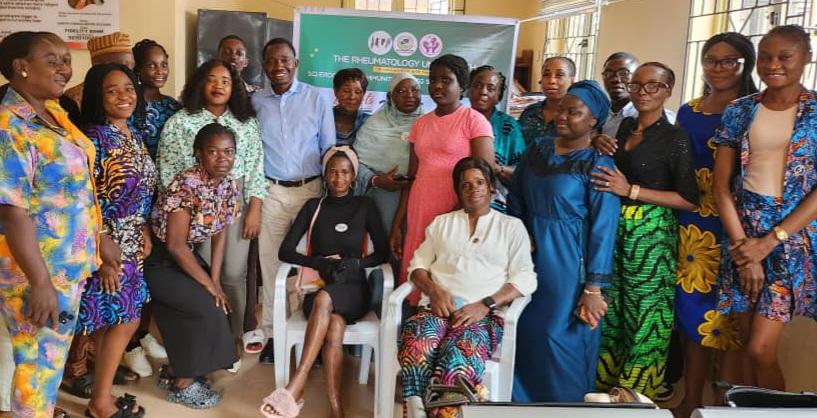By Yusuf Mohammed
The Scleroderma community in Nigeria, in collaboration with the LUREG Support Foundation and the Lagos State University Teaching Hospital (LASUTH), recently joined the rest of the world in commemorating World Scleroderma Day, a day recognized by the World Health Organization (WHO) to raise awareness about the autoimmune condition known as scleroderma. As with many health observances in Nigeria, this year’s commemoration was yet another reminder of how the nation’s fragile healthcare system and mass medical brain drain continue to fail patients living with rare diseases.
Scleroderma is a rare and chronic autoimmune disease in which the body’s immune system mistakenly attacks its own tissues, leading to hardening and tightening of the skin. In more severe cases, it affects vital organs such as the lungs, heart, kidneys, digestive tract, and blood vessels. The term scleroderma is derived from the Greek words sclero (hard) and derma (skin), which aptly describe the most visible feature of the disease, tight, thickened patches of skin.
In Nigeria, as in many developing countries, diseases that are non-contagious and relatively rare often go unnoticed by government agencies and major healthcare institutions. Because scleroderma does not pose an immediate threat to public health in the way contagious diseases do, it is largely ignored. Unfortunately, funding and attention in the Nigerian healthcare system tend to follow the flow of donor grants and international aid, most of which are directed toward infectious diseases like malaria, tuberculosis, and HIV/AIDS. Consequently, scleroderma patients are left to navigate their condition in silence and isolation.
For patients, the journey is often harrowing. The condition comes with a heavy physical, emotional, and financial toll. Many lose their livelihoods because the disease affects their mobility and strength. The symptoms can be disfiguring, leading to stigmatization and withdrawal from social life. Worse still, medications and regular hospital visits are expensive, and most patients must rely on friends and family for financial support, support that is rarely sustainable.
Access to appropriate care is another significant hurdle. Scleroderma is primarily managed by rheumatologists, specialists who are in critically short supply in Nigeria. In a nation of over 200 million people, there are fewer than 40 qualified rheumatologists. Some states don’t have a single one. Patients are often forced to travel long distances just to get a diagnosis or consult with a specialist.

Dr. Etseoghena Igebu, a rheumatologist at the Lagos University Teaching Hospital, explained the importance of early detection in managing scleroderma. Speaking with The Columnist NG, she said, “Scleroderma is an autoimmune disease. When the immune system becomes deficient, it can begin to attack any part of the body, especially collagen-producing organs. This includes the skin and connective tissues.”
According to Dr. Igebu, while awareness is improving, it remains dangerously low. “In the 80s and early 90s, medical students were not adequately taught about autoimmune diseases. Even now, many general practitioners can miss the signs. The disease manifests on the skin, and because of its appearance, people often assume it is contagious. This leads to stigmatization and isolation.”
She emphasized that awareness is the first step toward proper management. “If people recognize the signs early, such as swelling in the hands, and are encouraged to seek medical help instead of hiding, the outcomes are usually much better.”
Unfortunately, even those who seek help are often met with delay and misdiagnosis due to the chronic shortage of specialists.

Dr. Hakeem Babatunde Olaosebikan, a consultant rheumatologist and lecturer at LASUTH, highlighted how the japa syndrome, a popular Nigerian term referring to the mass emigration of skilled professionals, has worsened the already bleak situation. “About seven years ago, you could find a rheumatologist in almost every state. Today, the numbers have plummeted.”
Dr. Olaosebikan painted a dire picture of the current reality: “Lagos, the most populated and advanced state, has just five rheumatologists. In the entire South-West, there are only eight. The North-Central zone has just two, both located in Jos. The North-East has only one, based in Maiduguri. The South-East has five, and the South-South only six. We do not even have 40 fully qualified rheumatologists in the whole country.”
The “japa” trend, driven largely by economic hardship, insecurity, and poor working conditions, has decimated Nigeria’s medical workforce. While rheumatology is suffering, the situation cuts across all specialties. For diseases like scleroderma, which require constant monitoring and specialist care, the loss is devastating.
Dr. Olaosebikan noted that patients often arrive at hospitals with late-stage complications, including organ failure, because they could not afford diagnostic tests earlier. “By the time many patients get to us, their condition has worsened. We are seeing a major decline in the quality of care and outcomes,” he said. “Our healthcare system is trapped in a vicious cycle. The doctors are leaving, drugs are getting more expensive, and the knowledge gap is widening.”
To make matters worse, even the little awareness that exists about scleroderma is usually confined to urban centers. In rural areas, myths and misconceptions abound. Skin conditions are frequently attributed to spiritual causes or supernatural forces, leading many to seek help from traditional healers instead of medical professionals.
Beyond the personal tragedies of those living with scleroderma, there is a broader public health concern. When specialists leave and healthcare infrastructure deteriorates, it affects the entire population. Diseases like scleroderma may be rare, but their management requires a level of medical sophistication that also benefits patients with other complex conditions. The loss of skilled professionals creates a vacuum that affects maternal health, emergency care, surgical services, and even basic diagnostics.
Experts agree that urgent action is needed. Dr. Olaosebikan called on the government to declare a state of emergency in the healthcare sector. “We need massive investment, not just in infrastructure but in human capital. If the economy improves, many of those who left will come back. But we must also provide incentives for those still here to stay.”
In the meantime, support groups and non-governmental organizations like the LUREG Foundation are stepping in to fill the gap. They organize awareness campaigns, provide limited financial aid, and offer counseling to patients and their families. However, their efforts, while commendable, cannot replace systemic government intervention.
On this year’s World Scleroderma Day, the Nigerian scleroderma community once again amplified their voices, not just to raise awareness about the disease, but to call attention to the systemic neglect and human resource crisis plaguing the nation’s healthcare system. Their message is clear: diseases like scleroderma may be rare, but the suffering of patients is real and preventable. With better funding, policy prioritization, and a reversal of the brain drain, Nigeria can begin to offer hope to those fighting this silent battle.
Until then, patients will continue to bear the brunt of a system that has, for too long, ignored them.















